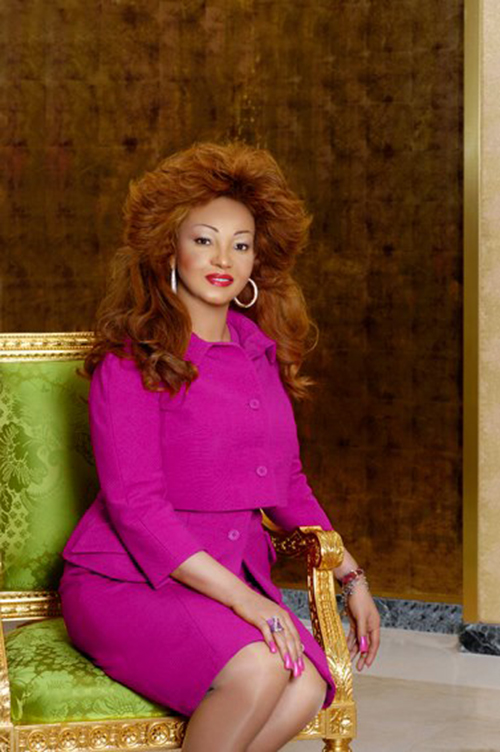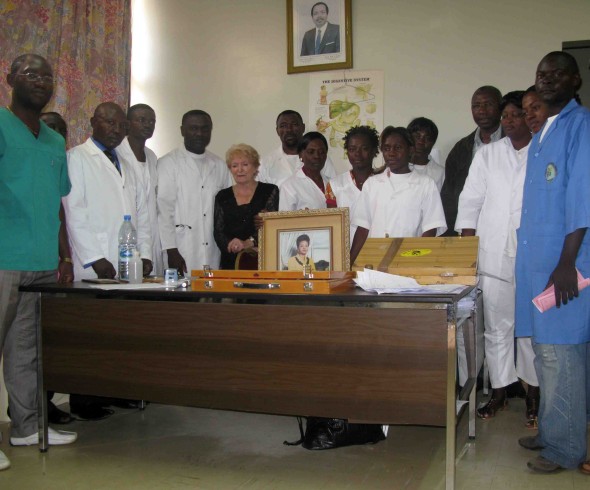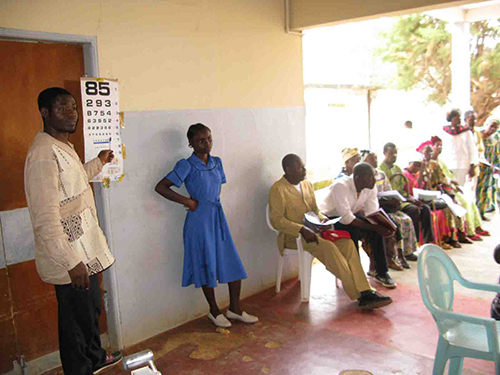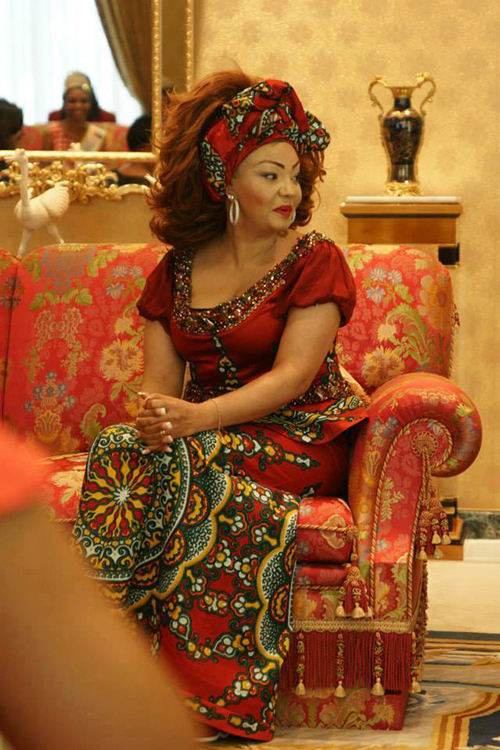A First Lady Who Puts the Last First. The eponymous charitable Foundation of Cameroon First Lady Chantal Biya is teaming up with the French Association of the world’s oldest international charity, the Order of Malta, to alleviate poverty and eye disease and raise life expectancies among the remotest communities of Cameroon, and, in turn, of the whole African Continent, and the world
20 May 2014
9,820 views
No Comment
Ophtalmo Sans Frontières (OSF), a partnership between the Chantal Biya Foundation (CBF) of Cameroon and the French Association of the Order of Malta (FAOM), is aiming to provide ophthalmic disease screenings –incorporating diagnosis, treatment, surgery, and eyewear prescription– for 80,000 people living in remote rural areas of Cameroon, by 2016.
Cameroon’s First Lady, Mrs. Chantal Biya, is very kind: a high-profile international figure whose prestigious status is matched by an evangelical sense of altruism.
At a time in our history when the rich and powerful are venerated for their privilege while the poor are vilified for their poverty, it is highly commendable, and vital in terms of readjusting this skewed perspective, that prominent personalities such as Mrs. Chantal Biya should highlight the plight of the world’s forgotten people and take action to alleviate the scourges of their impoverishment.
One such scourge which grows in the shadows of communal indigence is eye disease.
According to a Chantal Biya Foundation spokesperson:
“The objectives for sustainable human development cannot be achieved without a significant reduction in eye disease and blindness.”
The Chantal Biya Foundation (CBF), in partnership with the French Association of the Order of Malta (FAOM), is a non-profit humanitarian organisation in Cameroon (Registration No: 93/098/30 April 1999).
The CBF was founded in 1994 in a bid to raise national and international awareness of the fight against poverty, disease and social exclusion in urban and rural areas of Cameroon. Its’ eponymous founder, Mrs. Chantal Biya, is the wife Cameroon’s President Paul Biya.
The main aims of the Chantal Biya Foundation are to assist vulnerable sections of the Cameroonian population and combat the miseries of poverty and disease.
Recently, the CBF has been granted a special consultative status recognised by the Economic and Social Council of the United Nations, and is a member of:
L’ Organisation Internationale de la Francophonie (OIF) which represents the international French-speaking community.
The CBF works to prevent blindness, restore eyesight and promote eye health.
The Foundation intends to:
-
Ensure the provision of education and healthcare for mothers and children;
-
Provide care for abandoned children and the elderly;
-
Provide hospitals and health centres and ensure adequate supplies of drugs and medical aids.
The CBF’s core aim is to put an end to preventable and treatable eye diseases.
The CBF’s schedule and timing are based around the availability of Dr. Jeanne Bonnefous.
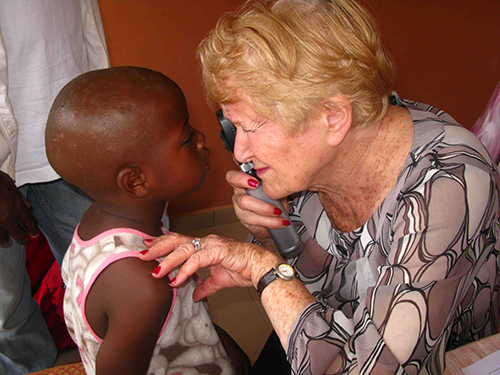
Dr. Jeanne Bonnefous Vice – President of Ophtalmo Sans Frontières and representative of the Order of Malta – France for eye care in Cameroon.
The Bridge MAG. Image
Dr. Jeanne Bonnefous
Is Ophthalmologist in Paris. She worked at the Rothschild Foundation in Paris.
More recently, on Friday October 4th 2013, during the award ceremony, of Merit of the Order of Malta, held at the Embassy of the Order of Malta in Yaoundé, Cameroon, Dr Jeanne Bonnefous was awarded a:
Croix de Chevalier du mérite de l’Ordre de Malte in recognition of her work by M. Jean-Christophe Heidsieck.
M. Jean-Christophe Heidsieck is, Ambassador of the Sovereign Order of Malta in Cameroon.
She is currently Vice – President of Ophtalmo Sans Frontières and representative of the Order of Malta – France for eye care in Cameroon.
One of the unique selling-points of the CBF’s Meyomessala Medical Centre is its’ advanced and shifting strategy, which aims to provide essential healthcare for a population living in a remote area. Its’ staff are well-versed in understanding the lifestyle hazards and associated health needs of rural populations.
The French Association of the Order of Malta (FAOM) has been providing medical treatment for rural populations living in remote areas for several years now.
The FAOM has been using its know-how and expertise to improve rural eye healthcare by providing patients with ophthalmic medicines and spectacles.
Local authorities and government agencies will provide both charities with logistical support and guidance on nutrition, housing, sanitisation and other aspects in the promotion and implementation of the ‘Ophtalmo Sans Frontières’ (OSF) campaign.
About the Order of Malta
The Order of Malta (OM) is a neutral, impartial organisation of a non-political nature that makes support available in situations and places where access by other organisations is difficult.
The Order of Malta is the world’s oldest international charity, dating back to the Knights Hospitallers of the 11th century.
It has a strong medical as well as social heritage, committed to combating poverty and disease. The Order has 12,500 members in total, and tens of thousands of volunteers deployed around the world who operate within 47 national associations covering 102 diplomatic missions in 120 countries.
The OM is also a religious order, rooted in the Roman Catholic Church wherefrom it inherits its fundamental humanitarian ethics and values.
The FAOM’s Global Fund makes approximately 40 grants available annually to support forgotten peoples around the world.
Priority areas are
• Forgotten diseases
• Maternal and neonatal health
• Prisoners’ children
• The elderly
• Disabled children and adults
• The homeless
• Displaced people
• Marginalised communities
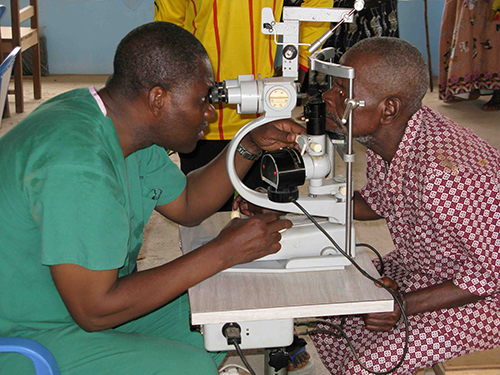
A Meyomessala medical centre Ophtamologist staff performing an eye screening test.
The Bridge MAG. Image
The Chantal Biya Foundation has now gone into partnership with the FAOM for the support for forgotten peoples under the umbrella name, Ophtalmo Sans Frontières (OSF).
Statistics
The OSF faces many obstacles in relation to its eye care campaign, such as:
• The misunderstanding and impatience of some patients in the areas visited;
• The bad state of roads, especially during the rainy season;
• Remoteness of many locations;
• Poorly lit consultations –impact: visiting is relatively indiscreet;
• Delay observed in the administration of certain meals;
• Lack of collaboration in some health districts;
• Difficulties in communication with patients speaking exclusively in their local dialect, due to lack of translators;
• Scepticism of some patients because of disappointments experienced with previous health teams.
But some positive observations can also be drawn: according to recent statistics, the OSF has achieved dramatic results since its creation.
The state of eye care in rural communities in particular and the state of health broadly speaking have dramatically improved through the auspices of OSF.
Between November 2010 and May 2014 it was reported that “28,417 patients consultations and eye screenings and 38,979 ophthalmological pathologies were conducted and diagnosed respectively. The main ophthalmic pathologies diagnosed and treated included presbyopia, hyperopia, myopia, cataracts and allergy-related conditions.”
In terms of the distribution of patient screenings by age group and gender, figures show that women are the most consulted (60%; men: 40%).
In addition to this data, it was also found that “64% of patients seen are over 40 years of age. Presbyopia is more common among 40+ years. The 16–39 years tranche represents 27% of the population of patients with early cases of presbyopia, peaking at around 33 years of age. 9% of the population consulted are 15 years old.”
OSF representatives and staff of the Meyomessala CBF medical centre (Dr. Njoume Eyame Raymond Leopold, is Doctor in Public Health and the Head of the Centre) have managed to overcome the geographical, social, cultural and communication barriers to successfully treating populations living in remote areas in Cameroon –and in these senses, has indeed accomplished a new provision of ophthalmic care without frontiers.
Dr Raymond Tchakounté, – economist in development- and Dr Njoume Eyame Léopold Raymond, are both in charge of the planning schedule of task in ophthalmic partnership FCB / OMF in Cameroon.
The remotest Cameroonian communities have subsequently benefited from high-quality eye care services, with prioritised treatment for those most in need, such as children and the elderly.
One of the broader goals of the CBF is to make available basic health care for Cameroon’s vast rural and urban populations.
There are several factors that necessitated this campaign and the integrated strategy of the CBF and FAOM towards assisting rural Cameroonian populations.
This strategy integrates and triangulates with the strategies of the Cameroonian health system, taking into account the importance attributed to all preventative and curative approaches.
The campaign aims to cover a wide area of rural Cameroon.
Its mission is to raise awareness of eye diseases and provide preventative, palliative and alleviative treatment of a vast and dizzying range of ophthalmic conditions:
conjunctivitis, cataracts, presbyopia, hyperopia, myopia, pterygium, astigmatism, glaucoma, ametropia, asthenopia, retinopathy, strabismus, chalazion, aphakia, pseudophakia, ametropia, asthenopia and chalazion.
The remoteness of most ophthalmologists to the rural areas of Cameroon makes eye care very difficult for people to access.
The World Health Organisation (WHO) estimates that “About 285 million people worldwide live with serious vision impairment.” 39 million of these people are blind, and 246 million have moderate to severe visual impairment. According to the WHO factsheet on this subject:
-
Without effective, major intervention, the number of blind people worldwide will rise to 76 million by 2020;
-
80% of blindness is avoidable – that means: treatable and/or preventable;
-
90% of blind people live in low-income countries;
-
153 million people simply need eyeglasses to correct refractive errors (near-sightedness, far-sightedness or astigmatism);
-
Restoration of sight and blindness prevention strategies are among the most cost-effective interventions in health care.
British academic and international development practitioner Robert Chambers wrote in his book Rural Development: Putting the Last First, in 1983:
“Rural poverty in the third world deserves attention and efforts because it is less visible.”
Under the slogan Sight Is Life the CBF highlights ophthalmologic diseases as pivotal factors in need of alleviation if the Foundation’s fundamental aim of making available basic healthcare for Cameroon’s vast rural populations is to be successful.
Bridging the vast qualitative and quantitative gaps in urban and rural health provision is absolutely vital in the global fight against poverty and disease.
About Mrs. Chantal Biya
Behind the regal bearing and refined beauty, the blooming face and gracious Mona Lisa smile of Mrs. Chantal Biya is much more than meets the eyes.
To the many, Mrs. Chantal Biya is the graceful face of Cameroon, the perfect presidential spouse, a personification of what a First Lady should be: well-dressed, willing, amiable and approachable. She is also as empowering as she herself empowered, and highly influential.
In recognition of all her humanitarian and charitable endeavours, during a ceremony held at the Sheraton Hotel in Belgium on Wednesday 2nd April 2014 to pay tribute to the Association of African First Ladies (AAFL), Mrs. Chantal Biya was designated Matron of the Association of the Wives of African Ambassadors (AWAA), alongside some other of Africa’s first ladies.
The AWAA was founded in Belgium in November 2013 to foster a positive image of the African Continent, which is so often negatively associated with poverty, disease, stereotyped as the world’s main location for leprosy, economic insecurity and social injustice.
But perhaps Mrs. Chantal Biya’s most significant contributions –and certainly one of her most well-known in Cameroon and across the world– is her constant and persistent effort trough her Foundation to improve the lives of rural peoples through integrated health and community development activities.
In addition to these achievements, Mrs. Chantal Biya is also revered for her unprecedented efforts to reduce the global spread of AIDS, through the efforts of her other non-governmental organization,African Synergy, which has been working relentlessly to assist AIDS-afflicted children and orphans in Africa.
Among many initiatives, African Synergydistributes food, clothes and toys to vulnerable children and orphans in Yaoundé, Douala, and across Cameroon. African Synergyalsoinvests in education.
The CBF will also provide material and financial support to other associations and non-governmental organisations involved in the fight against AIDS, as well as hosting the annual Aids Free Holiday, designed to raise the youth awareness about the dangers of AIDS during the school holiday periods.
The scope and extent of Mrs. Chantal Biya’s charitable and philanthropic activism is prodigious, and goes far beyond the usual bounds of the “official role” customarily ascribed to First Ladies. She is so much more than simply the wife of the President of the Republic of Cameroon: Mrs. Chantal Biya is a personification of the country’s social conscience.
Her Unrivalled Achievements
Mrs. Chantal Biya is an advocate for changes that create long-term impacts and solutions to issues of world health. She founded the International Reference Centre for research into HIV and AIDS prevention and management.
Also know under the acronym (CIRCB) the Chantal Biya International Reference Centre for Research on HIV/AIDS , which is located on the premises of the African Synergy headquarters in Yaoundé is the result of a huge advocacy initiated by African first ladies through the non-governmental African Synergy in partnership with the Italian Government, the World Foundation for AIDS Research and Prevention, UNESCO and the Institute of Human Virology.
So, why do we choose May the 20th to pay tribute to the charitable achievements of Cameroon’s First Lady: because May 20th is the National Day for the Republic of Cameroon.
There is no more fitting day, therefore, for The Bridge Magazine to invite its worldwide readership inside the life of Cameroon’s First Lady.
May the 20th 2014 may also be perceived as the hinge year in terms of international development, being the eve of the unveiling of the United Nations’ Millennium Development Goals (MDGs).
The UN’s eight MDGs, agreed by all nations and the world’s leading developmental institutions, will include such goals as dramatically reducing extreme poverty rates and preventing the further spread of HIV/AIDS, by the target date of 2015.
The MDGs have galvanized unprecedented efforts to meet the needs of the world’s poorest populations. Mrs. Chantal Biya’s inspirational humanitarian accomplishments are so much in tune with the United Nation Millennium Development Goals, as they contribute to raising the threshold of life expectancy in Cameroon and the world over.


